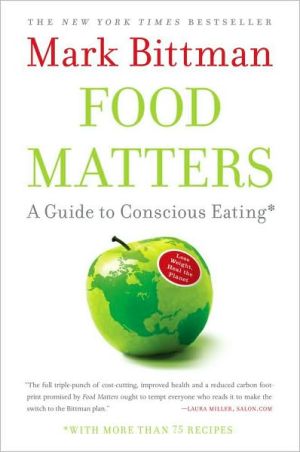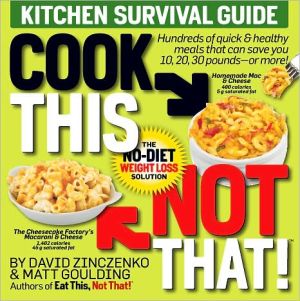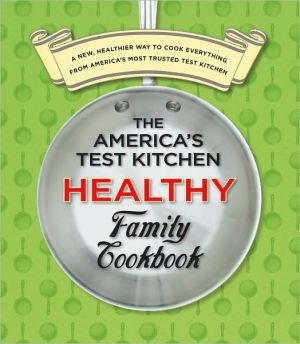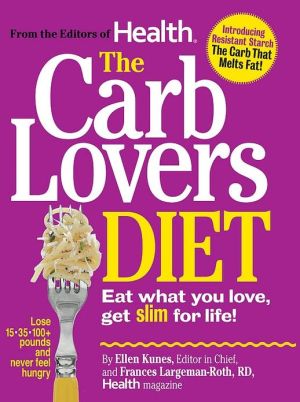Food Matters: A Guide to Conscious Eating with More Than 75 Recipes
From the award-winning champion of culinary simplicity who gave us the bestselling How to Cook Everything and How to Cook Everything Vegetarian comes Food Matters, a plan for responsible eating that's as good for the planet as it is for your weight and your health.\ We are finally starting to acknowledge the threat carbon emissions pose to our ozone layer, but few people have focused on the extent to which our consumption of meat contributes to global warming. Think about it this way: In...
Search in google:
From the award-winning champion of culinary simplicity who gave us the bestselling How to Cook Everything and How to Cook Everything Vegetarian comes Food Matters, a plan for responsible eating that's as good for the planet as it is for your weight and your health. We are finally starting to acknowledge the threat carbon emissions pose to our ozone layer, but few people have focused on the extent to which our consumption of meat contributes to global warming. Think about it this way: In terms of energy consumption, serving a typical family-of-four steak dinner is the rough equivalent of driving around in an SUV for three hours while leaving all the lights on at home. Bittman offers a no-nonsense rundown on how government policy, big business marketing, and global economics influence what we choose to put on the table each evening. He demystifies buzzwords like "organic," "sustainable," and "local" and offers straightforward, budget-conscious advice that will help you make small changes that will shrink your carbon footprint — and your waistline. Flexible, simple, and non-doctrinaire, the plan is based on hard science but gives you plenty of leeway to tailor your food choices to your lifestyle, schedule, and level of commitment. Bittman, a food writer who loves to eat and eats out frequently, lost thirty-five pounds and saw marked improvement in his blood levels by simply cutting meat and processed foods out of two of his three daily meals. But the simple truth, as he points out, is that as long as you eat more vegetables and whole grains, the result will be better health for you and for the world in which we live. Unlike most things that are virtuous and healthful, Bittman's plan doesn't involve sacrifice. From Spinach and Sweet Potato Salad with Warm Bacon Dressing to Breakfast Bread Pudding, the recipes in Food Matters are flavorful and sophisticated. A month's worth of meal plans shows you how Bittman chooses to eat and offers proof of how satisfying a mindful and responsible diet can be. Cheaper, healthier, and socially sound, Food Matters represents the future of American eating. The Washington Post - Fuchsia Dunlop Like Michael Pollan in In Defense of Food, Bittman takes a commonsense approach, telling readers that it's simple to eat well: Just "eat less meat and junk food, eat more vegetables and whole grains." Indeed, Food Matters reads like a practical companion to Pollan's book.
Introduction\ Two years ago, a report from the United Nations Food and Agriculture Organization (FAO) landed on my desk. Called Livestock's Long Shadow, it revealed a stunning statistic: global livestock production is responsible for about one-fifth of all greenhouse gases — more than transportation.\ This was a signal moment for me, coming along with some personal health problems, an overall gloomy global outlook, and an increasing concern with animal products in general — the quality of meat, the endangerment of wild fish, the way domestic animals are raised, and the impact our diet has had on the environment. Never before had I realized issues of personal and global health intersected so exquisitely. The destiny of the human race and that of the planet lay in our hands and in the choices — as individuals and as a society — that we made.\ If I told you that a simple lifestyle choice could help you lose weight, reduce your risk of many long-term or chronic diseases, save you real money, and help stop global warming, I imagine you'd be intrigued. If I also told you that this change would be easier and more pleasant than any diet you've ever tried, would take less time and effort than your exercise routine, and would require no sacrifice, I would think you'd want to read more.\ When you do, you'll find an explanation of the links among diet, health, the environment in general and climate change in particular and you'll see how you can make a difference. And while you're doing your part to heal the planet you'll improve your health, lose weight, and even spend less at the checkout counter. And yes: This is for real.\ The consequences of modern agriculture\ It doesn't take a historian to see that events that took place hundreds or even thousands of years ago reverberate to our day, and it doesn't take a scientist to see the profound effects of every significant advance in technology, from the invention of the wheel and the internal combustion engine to that of the microchip.\ Unfortunately, we can rarely anticipate the consequences of historical events, inventions, and new technologies. Some have had nearly entirely positive results: indoor plumbing and vaccinations have saved countless lives, and it would be hard to argue that the telephone or railroads were not almost entirely positive. Automobiles, with their huge demand on limited energy sources, are a tougher call.\ The industrialization of food production was one development that — though positive at first — is now exacting intolerable costs. Just as no one could foresee that cars would eventually suck the earth dry of oil and pollute the atmosphere to unsafe levels, no one could have anticipated that we would raise and eat more animals than we need to physically sustain us, that in the name of economy and efficiency we would raise them under especially cruel conditions (requiring some humans to work under cruel conditions as well), or that these practices would make them less nutritious than their wild or more naturally raised counterparts and cause enormous damage to the earth, including the significant acceleration of global warming.\ Yet that's exactly what has happened. Industrialized meat production has contributed to climate change and stimulated a fundamental change in our diets that has contributed to our being overweight, even obese, and more susceptible to diabetes, heart disease, stroke, and perhaps even cancer.\ It isn't just our propensity for eating animal products that's making us fat and sick, but also our consumption of junk food and overrefined carbohydrates. And these foods — which as a group are also outrageously expensive, especially considering their nutritional profiles — are also big contributors to environmental damage and climate change.\ The twentieth-century American diet, high in meat, refined carbohydrates, and junk food, is driven by a destructive form of food production. The fallout from this combination, and the way we deal with it are issues as important as any humanity has faced: The path we take from this crossroads will determine not only individual life expectancy and the quality of life for many of us, but whether if we were able to see the earth a century from now we would recognize it.\ Climate change is no longer a theory, and humans will suffer mightily if it isn't reversed. Most people know this. Less well known is the role that raising livestock plays in this, which is greater than that of transportation. Equally certain is that many lifestyle syndromes and diseases are the direct or indirect result of eating too many animal products. Our demand for meat and dairy — not our need, our want — causes us to consume way more calories, protein, and fat than are good for us.\ Why food matters\ Global warming, of course, was accidental. Even 30 years ago we couldn't know that pollution was more than stinky air. We thought it caused bad visibility and perhaps a few lung diseases here and there — as if that weren't bad enough.\ The current health crisis is also an accident: We thought that the more meat and dairy and fish and poultry we ate, the healthier we would be.\ This has not proved to be the case. Overconsumption has been supported and encouraged by Big Oil and Big Food — the industrial meat and junk food complex — in cahoots with the federal government and even the media and (one might say socalled) health industries. This has come at the expense of lifestyles that would have encouraged more intelligent use of resources — not just oil, but land and animals — as well as global health and longer life for individuals.\ It doesn't have to continue: by simply changing what we eat we can have an immediate impact on our own health and a very real effect on global warming — and the environment, and animal cruelty, and food prices.\ That's the guiding principle behind Food Matters, and it's really very simple: eat less meat and junk food, eat more vegetables and whole grains. I'm not talking about a diet in the conventional sense — something you do for two weeks or three months and then "maintain." I'm not suggesting that you become a vegetarian or eat only organic food. I'm not even talking about a method for weight loss, per se, though almost anyone who makes the kinds of changes I'm suggesting here is likely to lose weight and keep it off. You won't be buying exotic foods or shopping in expensive specialty markets, and you won't be counting calories — or anything else.\ I'm just suggesting eating less of some things and more of others. The results will make you healthier while you do a little toward slowing climate change — much like trading in your gas guzzler for something more energy and cost efficient.\ You could stop reading now and put your own plan into action. Or you can read on and find the details of how we allowed ourselves to be stuck with this mess and how you can help yourself and the rest of us get out of it. I'll describe what sane, conscious eating is, and the impact it will have. I'll suggest different strategies for changing how you think about food and prepare it. I'll show you how easy it is to follow the Food Matters plan when you eat out, whether at restaurants or other people's houses. I'll give you some sample menus and direction so you can easily create your own. Finally, I'm providing 77 easy recipes to get you started.\ At first my suggestions may seem radical, but they can be integrated gradually into any style of eating. There's no sacrifice here, only adjustment and benefit: I will not suggest that you cut your calorie consumption (I don't even advocate counting calories), though you probably will simply by following the plan. Other than suggesting that you pretty much rule out junk food, I won't put any foods off limits.\ The fact is that what I'm asking you to do isn't radical at all, and I'm confident you'll find this new mind-set so easy and so natural, and that you'll see its many benefits so easily, that you'll be eager to adjust your diet.\ Why me?\ Who am I to tell you how to eat and suggest it's a way to reduce global warming? I've been a reporter and researcher for more than 30 years; for much of that time, I've written about food from every possible angle. I've seen nutritional "wisdom" turned on its head more than once, and I've seen studies contesting studies designed to disprove studies. I have no more agenda than to inject some common sense into the discussion.\ It doesn't take a genius to see that an ever-growing population cannot continue to devote limited resources to produce ever-increasing amounts of meat, which takes roughly 10 times more energy to produce than plants. Nor can you possibly be "nice" to animals, or respectful of them, when you're raising and killing them by the billions.\ And it doesn't take a scientist, either, to know that a handful of peanuts is better for you than a Snickers bar, that food left closer to its natural state is more nutritious than food that has been refined to within an inch of its life, and that eating unprecedented quantities of animals who have been drugged and generally mistreated their entire lives isn't good for you.\ I've got plenty of evidence to back up what I'm saying in these pages, but I've got my own story, too, and maybe you'll find that equally convincing. (It begins on page 71.) I've tried to strike a balance here, avoiding citing an overwhelming number of studies in an attempt to prove my point; that approach doesn't work, anyway, because most data can be read many ways, depending on your prejudices. My contention is that this way of eating is so simple, logical, and sane that cherry-picking scientific research isn't necessary.\ One more thing: I'm not a doctor or a scientist, but I'm not a health-food or nutrition nut either. For my entire adult life I've been what used to be called a gourmand and is now called (unfortunately) a foodie: a daily and decent cook, a traveler who's eaten all over the world and written about it, a journalist and food lover who's eagerly devoured everything. I intend to continue to do just that, but in different proportions.\ For our own sakes as well as for the sake of the earth, we need to change the way we eat. But we can continue to eat well — better, in fact. In the long run, we can make food more important, not less, and save ourselves and our planet (and some money) by doing so.\ Copyright © 2009 by Mark Bittman
Preface viiIntroduction 1Part I Food MattersRethinking Consumption 9A Brief History of Overconsumption 21Selling the Bounty 31Does the Government Help or Hurt? 39So-Called Healthy Ingredients 53Sane Eating 67How to Eat Like Food Matters 81Part II Food Matters: RecipesHow to Cook Like Food Matters 111Meal Plans: A Sample Month 119The Basics 131Breakfast 161Lunch 179Snacks and Appetizers 217Dinner 237Desserts 285Sources 299Measurement conversions 311Acknowledgments 313General Index 315Recipe Index 319
\ From Barnes & NobleReading Mark Bittman's cookbooks, it's easy to see why his weekly New York Times column is called "The Minimalist." The author of How to Cook Everything and How to Cook Everything Vegetarian approaches kitchen craft and eating plans with a winning simplicity. Perhaps that's partly because Bittman first approached cooking as a journalist, not as a trained chef. This book demonstrates his ability to address multiple issues without sacrificing clarity. Food Matters aims at satisfying our appetites even as we shrink our tummies and reduce the size of our carbon footprint. Bittman is not a vegetarian, but his writing and recipes have long registered his insistence that we eat too much meat. With its clear analysis, decisive prescriptions, and delicious recipes, this cookbook-plus belongs on the shelf of anyone who loves food and/or cares about the environment.\ \ \ \ \ Fuchsia DunlopLike Michael Pollan in In Defense of Food, Bittman takes a commonsense approach, telling readers that it's simple to eat well: Just "eat less meat and junk food, eat more vegetables and whole grains." Indeed, Food Matters reads like a practical companion to Pollan's book.\ —The Washington Post\ \ \ Publishers WeeklyCookbook author Bittman (How to Cook Everything) offers this no-nonsense volume loaded with compelling information about how the food we eat is doing damage to the environment, what changes to make and why. Authors have covered this topic before (Michael Pollan, for example, in The Omnivore's Dilemma and In Defense of Food), but Bittman takes a practical turn by concluding with 77 recipes that make earth-friendly eating doable and appealing. His collection of reliable recipes even includes such meat dishes as Thai beef salad, which isn't meat-heavy, but rather has "just the right balance of meat to greens." There are also such staples as super-simple mixed rice; "chicken not pie"; and modern bouillabaisse. Bittman decries consumption of "over-refined carbohydrates," but doesn't leave off without some sweets, including chocolate semolina pudding and nutty oatmeal cookies-suggesting, as the whole book does, that a diet in synch with the needs of the earth doesn't result in a sense of utter deprivation. (Jan.)\ Copyright © Reed Business Information, a division of Reed Elsevier Inc. All rights reserved.\ \ \ \ \ Library JournalNew York Times columnist Bittman (How To Cook Everything) is trying to moderate our diets here, both for our own health as well as the health of the planet. The first half of the book focuses on the current state of American agriculture and food consumption. He discusses the ecological and economic effects of factory farming and government subsidies, as well as nutrition and our increasing consumption of processed foods and calories. The second half focuses on changing all that. His plan consists mainly of commonsense advice: limiting meat, simple carbohydrates, and artificial ingredients and filling up instead on whole grains, fruits, and vegetables. There is a month of menu suggestions, followed by a nice collection of recipes, which focus on natural ingredients and range from Braised Vegetables with Prosciutto to Chocolate Semolina Pudding. Each recipe includes many variations, with simplicity and flexibility encouraged throughout. Well written and thought-provoking, with appetizing recipes, Food Matters is a great addition to all libraries. [See Prepub Alert, LJ 9/15/08.]\ —Susan Hurst\ \ \








